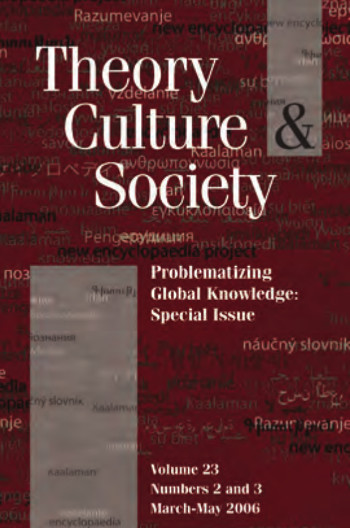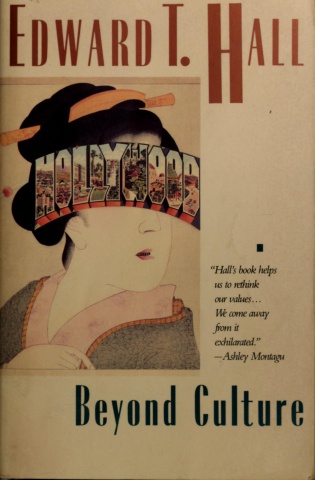Theory, Culture & Society 23(2-3): Problematizing Global Knowledge (2006)
Filed under book, journal | Tags: · aesthetics, archive, assemblage, body, classification, culture, encyclopedia, globalisation, information, knowledge, knowledge production, language, library, life, logic, media, modernity, network, public sphere, race, religion, science, space, technology, theory, time, translation, university, vitalism

In this special issue the TCS editorial board, along with colleagues in East and South-East Asia and other parts of the world, ventured in ‘encyclopaedic explorations’ in order to “rethink knowledge under the impact of globalization and digitization. The issue features over 150 entries and supplements on a range of topics which are addressed in terms of their relevance to knowledge formation, by contributors writing from a wide range of perspectives and different parts of the world. The entries and supplements are gathered under three main headings: metaconcepts, metanarratives and sites and institutions.”
Edited by Mike Featherstone, Couze Venn, Ryan Bishop and John Phillips, with Pal Ahluwalia, Roy Boyne, Beng Huat Chua, John Hutnyk, Scott Lash, Maria Esther Maciel, George Marcus, Aihwa Ong, Roland Robertson, Bryan Turner, Shiv Visvanathan, Shunya Yoshimi
With an Introduction by Mike Featherstone and Couze Venn
Publisher Sage, 2006
616 pages
Barry B. Powell: Writing: Theory and History of the Technology of Civilization (2009)
Filed under book | Tags: · alphabet, cuneiform, history of technology, language, technology, writing

“In this book the author explores writing not tied to speech, and traces the origins of writing tied to speech from ancient Sumer through the Greek alphabet and beyond. The book examines the earliest evidence for writing in Mesopotamia in the fourth millennium B.C., the relations of these systems to Ancient Egyptian, Chinese, and Mesoamerican writing, the origins of purely phonographic systems, and the mystery of alphabetic writing. With examples from contemporary and historical writing systems, and many illustrations, it shows how the structures of writing served and do serve social needs and in turn create deep patterns of social behavior.”
Publisher Wiley-Blackwell, 2009
ISBN 1405162562, 9781405162562
276 pages
Review (L. R. Siddall, Bryn Mawr Classical Review, 2010)
Comment (0)Edward T. Hall: Beyond Culture (1976)
Filed under book | Tags: · anthropology, brain, communication, culture, education, japan, language, memory, space, technology, time

“Edward Hall’s fifth book is both a summary of many themes first raised in his volume on proxemics in 1959 and a fresh insight more reminiscent of a psychologist than an anthropologist. The psychological flavor appears epigramatically in a double index to the book. First there is the ‘Index of IDEAS and techniques of TRANSCENDENCE’. Immediately following is an ‘Index of Themes’ in addition to the normal index one finds in most textbooks. The indexes signal a selfconsciousness of the main proposition advanced by Hall, viz., ‘What is called for is a massive cultural literacy movement that is not imposed but springs from within.’ This movement of the collective individual would begin to relieve the two cultural crises in the contemporary world of human experience. One crisis is the population/environment connection and the other, ‘equally lethal’, is man himself.
The analysis offered by Hall covers 15 chapters beginning with the paradoxical nature of culture, where persons and their mechanical/technological extensions are confused. In a populist flourish, Hall labels this tendency the ‘E.T. screen’. An Extension Transference emerges where one intellectually confuses an extension with the process extended. Hall readily admits this issue is not new, being the focus of the Korzybski heritage of General Semantics. Yet, Hall does make the heuristic point that culture per se is now a prime, systematic example of ET.” (from a review by Richard L. Lanigan, American Anthropologist, 1978)
Publisher Anchor Books, 1976
ISBN 0385124740, 9780385124744
320 pages
Review (Marc R. Tool, Journal of Economic Issues, 1977)
PDF (29 MB, no OCR)
See also his monograph The Silent Language, 1959.

